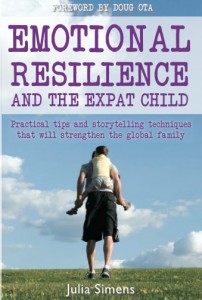Meet Julia Simens, an international relocation consultant with years of experience under her belt. She helps global families transition to new environments and new cultures.
Where are you from, Julia? Why did you decide to move to Balikpapan?
I’m from Kansas, USA. The reason for the move was to follow my heart. I returned to the USA to get my M.A. in Clinical Psychology when I met and fell in love with Kevin. We enjoy the adventure of living and working abroad as an expat family. We have lived on five continents, both of us doing jobs we love. Kevin took a posting with his company to work in Balikpapan. We moved here in November 2012.
What are your daily activities in Balikpapan at the moment?
Living in Balikpapan, I love to work in my garden. I grow herbs for cooking and flowers to share with friends. I spend a lot of time working on the computer. I currently do speaking engagements around the world. I get hired by schools, PTAs and organizations to talk about transitions and what we can do to help our children in this global lifestyle and how to work within a school system to get the best for everyone.
What drove you into the cultural adjustment counselling world? Has this been a lifelong passion of yours?
I have always loved children. When I was in college I was awarded a scholarship to take a voyage around the world teaching children in 10 different countries. I fell in love with the art of working with young children and their families worldwide. As an increasing number of children are being raised in foreign countries, as their parents are being sent abroad by their businesses or government agencies or they are people who want to see the world, I felt there was a need to help these families in global transition.
What are the main issues to tackle when first moving to a new country?
To me, the biggest challenge always seems to be to give up the stereotypes that you already have about the new location and to be able to genuinely understand it for what it is. There are plenty of news and travel stories about destinations around the world, Indonesia included, but they typically focus on the best (ideal vacation spots, for example) or the worst (places to avoid because of high crime rates, etc.). There is seldom any reality check on what is normal for that area, most of which wouldn’t be very interesting to people watching from afar.
For a family who’s constantly on the move, what should be their main ‘tool’ to keep in mind?
Healthy connections. Parents can ensure social and emotional stability in their changing environment by blending past and present. You have to connect to both the new location and your past locations or home. If you understand how the relationships develop, then you’ll have more success as a global nomad. It’s important for a family to deal with the emotional side of relocating, rather than letting it get swept under the rug. Any change is emotional, but that doesn’t mean it has to be negative.
What is your philosophy in overcoming overwhelming stress when dealing with adaptation to a new place?
One key psychological issue everyone faces is the need to belong. After we cover the basics – food, water, shelter and security – we need to find ‘our people’. We need to connect. We need to belong to a family, a community, a unit, a race of people, a tribe, a great school, a good job, etc. If we feel connected, we can feel happy and fulfilled.
How are these issues translated to adults? Do children who move a lot tend to keep the habit (or grow fond of it) as they become older?
The population I work with are called TCKs or Third Cultural Kids. TCK is a term used to refer to children who were raised in a culture outside of their parents’ culture for a significant part of their development years. Adult Third Culture Kids are a very interesting group. Many who have grown up in less developed countries will want to return to help others abroad. They pick a major at university that will allow them to return to that country to help their community. Then you have the complete opposite, the Adult TCKs who are eager to form roots. They might marry into a family that has been in one community forever. This gives them the ‘root-in-laws’ or connection that they feel they might have been missing.
Do you find children who were raised in Indonesia feel an emotional connection with this country and want to come back?
Children take on the roles and connections that their parents tend to value and care about. If an Indonesian family raises their child to feel an emotional connection to their homeland, that child will tend to return to Indonesia or seek out Indonesians around the world to help and support. This is why I encourage global families to make family traditions and rituals as they move around the world. This helps their child to have pride in their heritage and love of their culture.
Where have you lived before Balikpapan? Were you a travelling child as well?
I was a monocultural, non airplane-flying person until I hit the age of 19. After university, I taught in American Samoa and travelled around Oceania. Since then, I have lived and worked in the USA, Singapore, Australia, Indonesia, Nigeria, and Thailand. My speaking engagements and travel has now included too many locations to list.
Where have you travelled to in Indonesia?
In Indonesia, we have travelled to many locations in the Sumatran area. We loved the Thousand Islands outside of Jakarta with Kotok Island being one of my favourite locations. I really enjoyed my time in Darajat. Water sports in Sulawesi are real family fun. Ubud was a hit for our extended family as well as the temples and water activities in Bali. Lombok and Gili islands are beautiful. We have done family outings on Java including Jogjakarta. Now we are seeing areas on Borneo and in Kalimantan.
Tell us a little bit of FIGT, an organization you’re involved in?
I sit on the board of directors for FIGT (Families in Global Transitions). FIGT is the only US-based conference where representatives of the corporate, diplomatic, academic, the arts, military and mission sectors come to share cross-cultural coping strategies. This unique forum allows everyone to recognize the universal challenges of relocation and strategize on new methods and research. http://figt.org
Tell us also a little bit about your book, ‘Emotional Resilience and the Expat Child: Practical Storytelling Techniques that will Strengthen the Global Family’.
The book provides step-by-step guide designed to help a child become resilient and to increase a child’s emotional vocabulary and emotional intelligence. This workbook has been created for parents and children to use together and will provide the perfect place to connect. To illustrate this, I have taken stories from our own travels and connected an emotion to each event. It is available in paper or eBook format on Amazon.com.
In your opinion, is Indonesia quite accommodating when it comes to expat families? Are there enough support systems/organizations that facilitate good transitional periods for them?
My own global family has lived in four locations in Indonesia (Batam, Jakarta, Duri and Balikpapan) and we have found all locations in Indonesia to be friendly and accommodating for the expat family. Many large corporations are very good with packages for their global employee, but seldom include support for the global family. There is a huge difference between showing a family the available schools or homes to rent vs. actually supporting them as they transition into the new location.
What place/city do you consider your ‘home’?
I always say home is where my family is. My home now is Balikpapan; Mooreland, Oklahoma; Toronto, Canada and Golden, Colorado. I feel very comfortable and loved even if I am sleeping on a college futon or a living room couch while I visit family.




